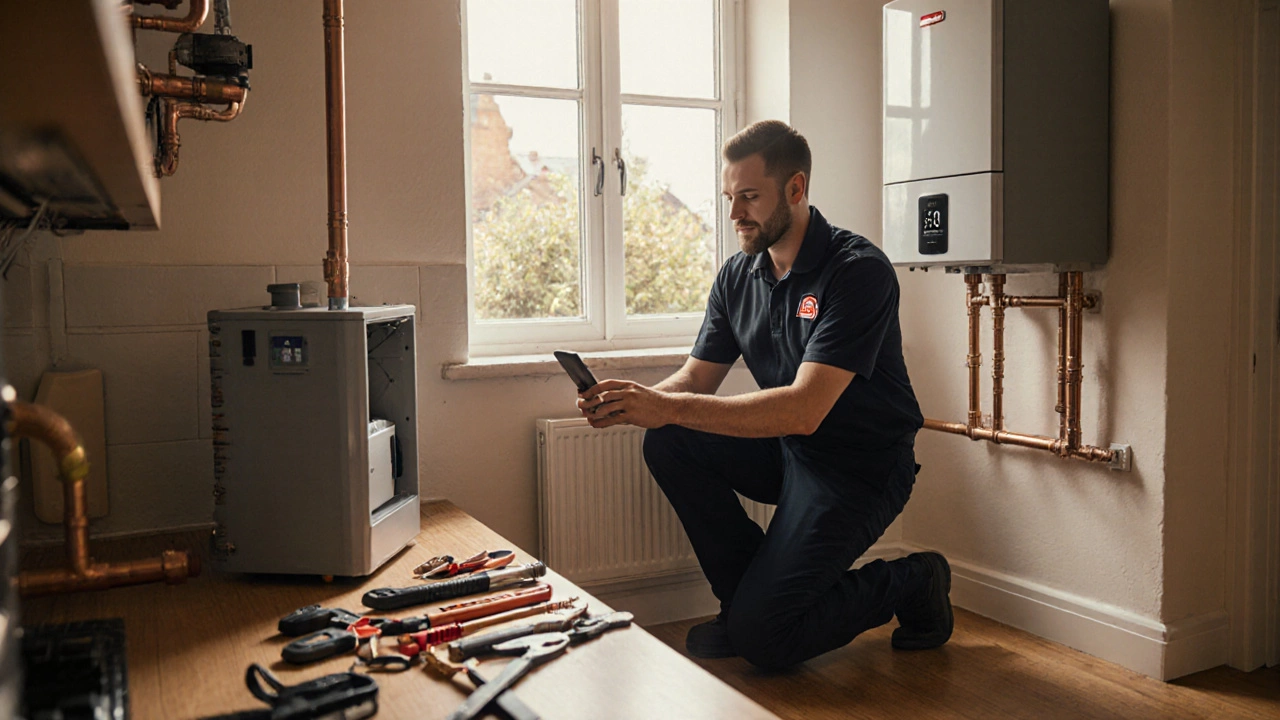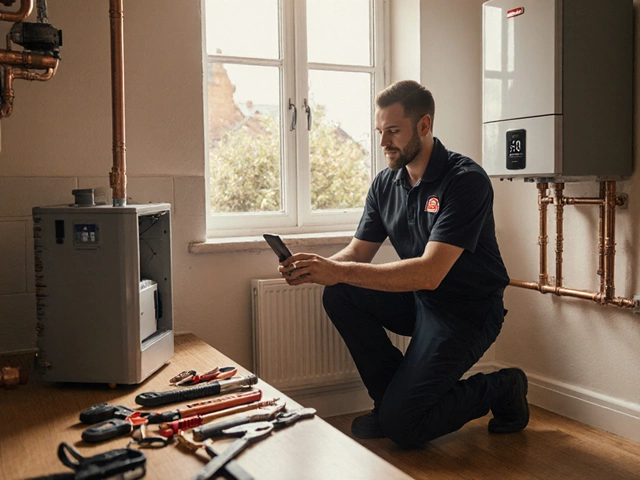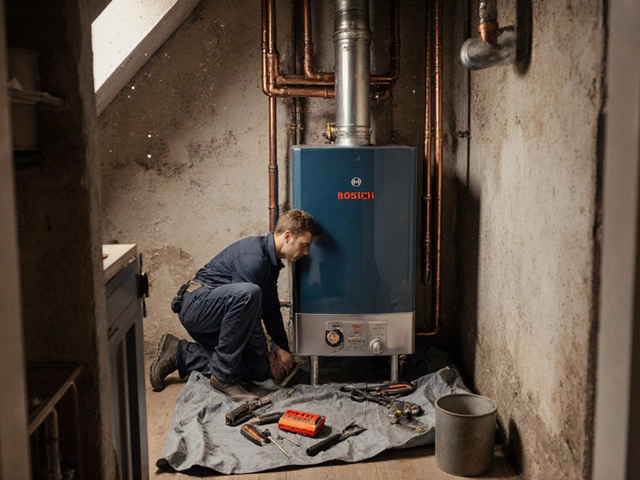Boiler Replacement Cost Calculator
Estimate Your Boiler Replacement Cost
Enter your details to get an accurate cost estimate for boiler replacement in 2025
Estimated Replacement Cost
Your estimated total cost
- Base Installation:£0
- Additional Work:£0
- Grant Savings:£0
Based on UK average energy prices and efficiency ratings
Replacing a boiler isn’t just about swapping out an old machine. It’s about comfort, safety, and your monthly energy bill. If you’re asking, are boilers expensive to replace?, you’re not alone. Most homeowners in the UK face this decision at least once in their lifetime-and the answer isn’t simple. It depends on the type of boiler, your home, where you live, and whether you’re just replacing like-for-like or upgrading.
What’s the average cost to replace a boiler in 2025?
In the UK right now, replacing a standard gas boiler costs between £2,000 and £4,000. That’s the typical range for a mid-range combi boiler installed by a Gas Safe registered engineer. But that number can swing higher or lower depending on a few key factors.
For example, a basic combi boiler like the Vaillant ecoTEC Plus or Worcester Greenstar CDi Compact, installed in a small flat with straightforward plumbing, might come in at £1,800-£2,500. On the other end, a high-efficiency condensing boiler with smart controls, installed in a large three-storey house with old pipework, can easily hit £4,500-£5,500.
Don’t forget: the price you’re quoted should include removal of the old boiler, disposal, new flue, system flush, thermostat installation, and safety checks. Some companies advertise low prices to get you in the door, then add extras later. Always ask for a full breakdown.
Boiler types and their price differences
Not all boilers are the same. The three main types in UK homes are combi, system, and regular (heat-only) boilers. Each has different installation costs.
- Combi boilers (most common): These heat water on demand and don’t need a tank. They’re compact, efficient, and ideal for smaller homes. Installation: £2,000-£3,500.
- System boilers: These work with a hot water cylinder but don’t need a cold water tank. Good for homes with multiple bathrooms. Installation: £2,500-£4,000.
- Regular boilers: These need both a cold water tank in the loft and a hot water cylinder. Common in older homes. Installation: £2,800-£4,500 because of extra pipework and tank removal.
Electric boilers are cheaper to install-around £1,500-£2,500-but they’re rarely cost-effective to run in the UK due to high electricity prices. Most people stick with gas.
What adds to the cost? Hidden expenses you can’t ignore
Many people are shocked when their boiler quote jumps £500-£1,000 after the engineer visits. Why? Because hidden issues show up during installation.
Here are the most common extras:
- Flue extension or relocation: If your old boiler was in a tight spot, the new one might need a longer or different flue. That’s £200-£600 extra.
- Upgrading pipework: Homes built before 2000 often have old, corroded pipes. Replacing copper or steel pipes with modern plastic can cost £300-£1,200.
- System flush: If your system is dirty (common after 10+ years), a power flush is needed. This isn’t optional-it prevents damage to the new boiler. Expect £300-£500.
- Smart thermostat: Not required, but highly recommended. A Hive, Tado, or Nest thermostat adds £150-£300, but saves 10-15% on heating bills yearly.
- Condensate pipe rerouting: If the new boiler location can’t drain into the original pipe, you’ll need to extend it to a drain or soakaway. £200-£400.
Always get a site survey before signing anything. A good engineer will point out potential extra costs upfront.
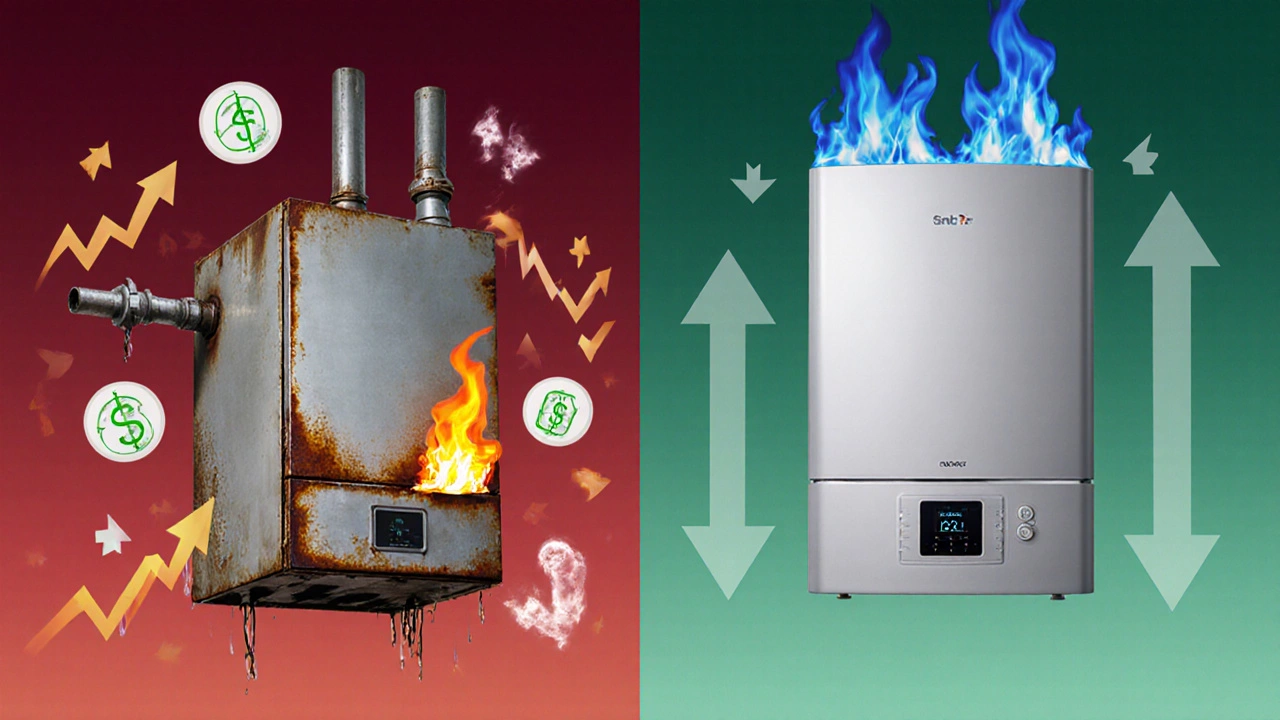
Is it cheaper to repair or replace?
If your boiler is over 10 years old and breaking down, repair might feel like the safe choice. But it’s often a trap.
Here’s a simple rule: if the repair cost is more than 50% of a new boiler’s price, replace it. For example, if a new boiler costs £3,000, don’t spend £1,500 on a repair unless it’s a minor fix like a pump or thermostat.
Older boilers are inefficient. A 15-year-old boiler might be running at 70% efficiency. A new A-rated model runs at 94%+. That’s a 24% drop in wasted energy. On a typical UK household’s gas bill of £1,200/year, that’s £288 saved annually. In under 11 years, you’ve paid for the new boiler just in energy savings.
Plus, older boilers are more likely to break down in winter. A broken boiler in January isn’t just inconvenient-it’s dangerous. You risk no heating and no hot water during the coldest months.
Government grants and financial help
You might be eligible for help paying for a new boiler. The UK government still runs schemes to support low-income households and those in energy-inefficient homes.
- Boiler Upgrade Scheme (BUS): Offers up to £7,500 toward heat pumps, but not gas boilers. So if you’re replacing gas with air-source or ground-source heat pump, this applies.
- Energy Company Obligation (ECO4): If you receive certain benefits like Pension Credit, Universal Credit, or Child Tax Credit, you might qualify for a free or heavily discounted boiler replacement. Eligibility varies by region and household income.
- Local council schemes: Some councils in Bristol, Birmingham, and Manchester offer boiler grants for residents over 60 or on low income. Check your local council’s website.
Don’t assume you’re not eligible. Many people miss out because they think they earn “too much.” Even if you’re just above the threshold, ask. Some schemes have flexibility.
How long does a boiler last-and when should you replace it?
Most boilers last 10-15 years. But that’s not a hard deadline. Some last 20 years with perfect maintenance. Others fail at 7 because they were poorly installed or never serviced.
Here are signs it’s time to replace, not repair:
- Age over 10 years + frequent breakdowns
- Strange noises (banging, gurgling, whistling)
- Pilot light keeps going out
- Yellow flame instead of blue
- Water leaks around the unit
- Increasing energy bills without usage changes
- Noisy radiators or cold spots
If you’ve had two or more repairs in the last year, replacement is almost always the smarter long-term move. Each repair chips away at the remaining life of the boiler-and you’re still stuck with an inefficient, aging system.
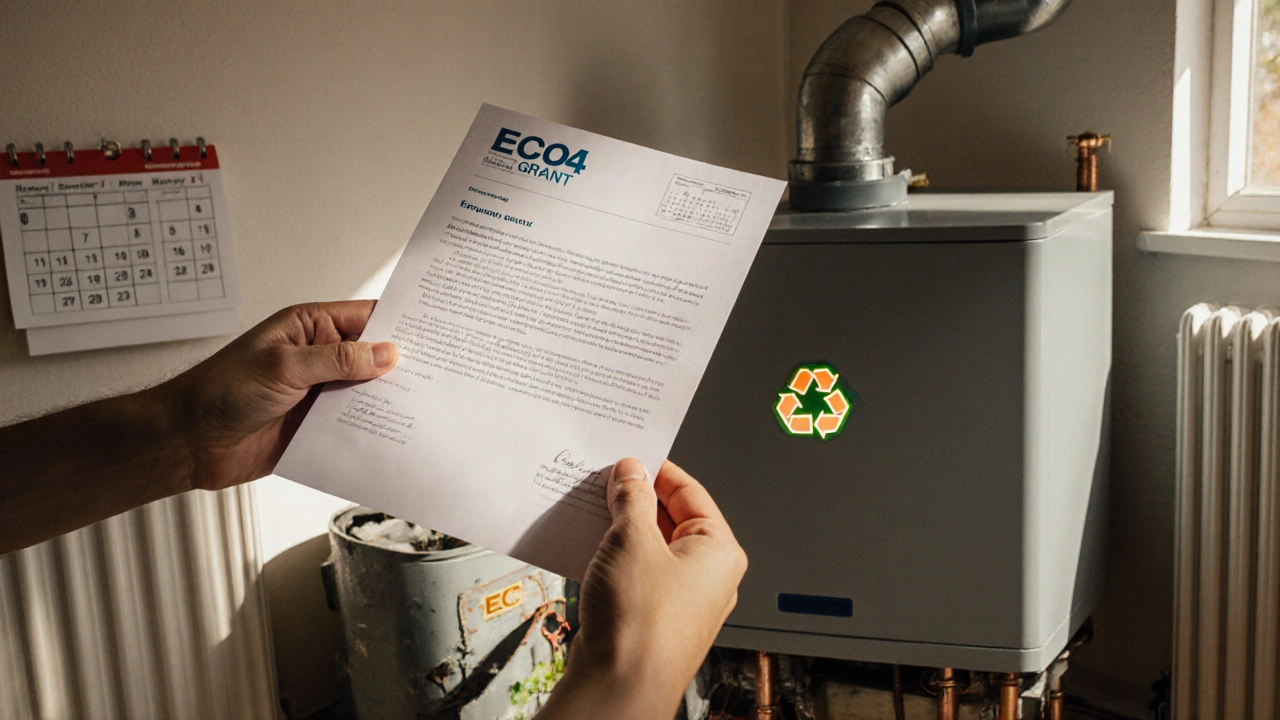
Choosing the right installer matters more than you think
The cheapest quote isn’t the best deal. A poorly installed boiler-even a top-of-the-line one-can cause problems within months.
Always use a Gas Safe registered engineer. You can verify their registration at gassafe.co.uk. Ask to see their ID card. Never let someone install without one.
Look for installers who offer:
- At least a 10-year warranty on the boiler (not just 1-2 years)
- Free system flush with installation
- Clear, written quotes with no hidden fees
- References or online reviews from local customers
Local companies often do better work than national franchises. They have a reputation to protect in your area. Ask neighbours who they used.
What happens to your old boiler?
Reputable installers remove and recycle your old boiler. It’s not dumped in a landfill. Copper, steel, and plastics are separated and reused. Some companies even offer a small discount if you keep the old unit for scrap-though most just take it away for free.
Never try to remove a boiler yourself. Gas lines, water pipes, and electrical connections are dangerous. Only a Gas Safe engineer can legally disconnect and dispose of it.
Final verdict: Are boilers expensive to replace?
Yes, replacing a boiler is a big expense. But it’s not a luxury-it’s a necessity for safety, comfort, and savings.
If your boiler is old, inefficient, or breaking down, the cost of replacement pays for itself in lower bills, fewer repairs, and peace of mind. A new boiler can cut your heating costs by 20-30% in the first year alone.
Don’t wait until winter hits. Get quotes in spring or summer when installers aren’t booked solid. You’ll get better prices and faster service. And if you’re eligible for a grant, apply early-funds run out fast.
Replacing a boiler isn’t just about spending money. It’s about investing in your home’s future.
Is it worth replacing a 10-year-old boiler?
Yes, if it’s showing signs of wear like frequent breakdowns, rising bills, or strange noises. A 10-year-old boiler is typically 70-80% efficient. A new A-rated model is 94%+. That means you’re wasting up to 20% of your gas bill. Over five years, the energy savings often cover the cost of replacement.
Can I get a free boiler replacement?
You might qualify for a free or heavily discounted boiler through the ECO4 scheme if you receive certain benefits like Pension Credit, Universal Credit, or Child Tax Credit. Eligibility depends on your income, home energy rating, and location. Contact your energy supplier or local council to check.
How long does a boiler replacement take?
Most boiler replacements take one day if it’s a like-for-like swap. If you’re upgrading the system-changing pipe layout, adding a smart thermostat, or relocating the boiler-it can take two days. Complex installations in older homes may take up to three days.
Do I need a new thermostat when replacing my boiler?
No, it’s not legally required, but it’s strongly recommended. A modern smart thermostat improves efficiency by 10-15% and gives you control over heating schedules. Most installers include one in their standard package now-it’s a small extra cost for big long-term savings.
Should I replace my boiler before it breaks down?
If your boiler is over 10 years old and you’re planning to stay in your home, yes. Waiting until it fails means you’ll be without heating in winter, and emergency replacements cost more. Planning ahead lets you compare quotes, wait for sales, and even apply for grants. It’s smarter, calmer, and cheaper.

